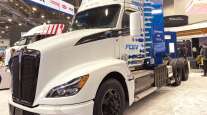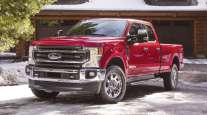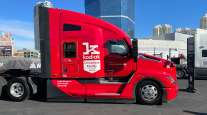Staff Reporter
EV Truck Technology Takes Center Stage at CES
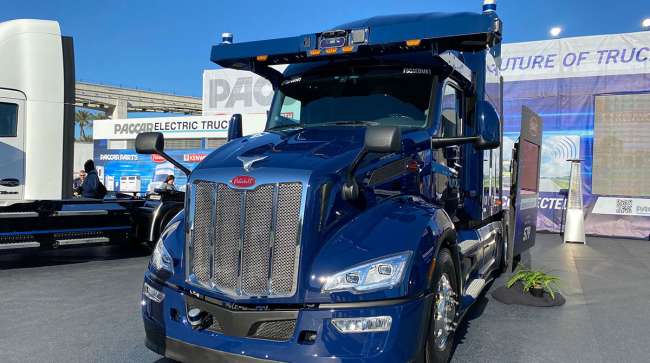
[Stay on top of transportation news: Get TTNews in your inbox.]
LAS VEGAS — Electric truck companies showcased just how far the technology has evolved during CES 2022.
“CES is a global stage for tech and, to an increasing degree, automotive companies,” Stephan Olsen, general manager at Paccar Innovation Center, told Transport Topics. “We take advantage of that platform to show the investments that we have made that are producing products today, as well as the investments we’re making for the future in electrification to solve zero-emissions needs in our marketplace.”
Paccar used the conference to showcase autonomous and connectivity technologies. The Kenworth T680E battery-electric truck and Peterbilt Model 579 were on display. The company also used the opportunity to discuss its Peterbilt Model 579EV, Model 520EV and Model 220EV.

Host Seth Clevenger, fresh from CES, discusses autonomous and electric trucks with Joe Adams of Kenworth and Cheng Lu of TuSimple. Hear a snippet above, and get the full program by going to RoadSigns.TTNews.com.
“We have three different models of electric vehicles available,” said Scott Newhouse, chief engineer at Peterbilt Motors Co. “We have our Class 8, model 579. We have our model 520, which is a low cab forward used for inner-city application. And we have our medium-duty pickup delivery, which is our model 220. Those are available for sale.”
Newhouse added that going forward there will be many opportunities to evolve and fine-tune the electric truck technology.
“EV is not a one-time thing,” Newhouse said. “Think about diesel engines. They’ve been in evolution for a hundred years. EV is the same so we continue to evolve our electric vehicle powertrain technologies with partners. They will continue to advance over the next several years, including fuel cell development.”
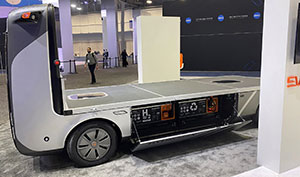
Side view of the Evocargo EVO.1 truck at 2022 CES. (Connor Wolf/Transport Topics)
Dubai, UAE-based Evocargo, a global logistics company and truck manufacturer working to make electric and hydrogen trucks that are also autonomous, showcased its EVO.1 truck.
“This is our first vehicle,” Andrey Bolshakov, founder and CEO at Evocargo, told TT. “It’s fully electric. So that’s why it’s really important for sustainability and for ecology in transportation. Most of the CO2 emissions right now from transportation come from trucks and vehicles at the facilities. That’s why we have imagined using electric vehicles to transform transportation in a better way.”
Blink Charging makes electric vehicle charging stations for passenger cars and commercial trucks. The company had several charging stations on display and used the conference to debut its 50kW DC Fast station for fleets.
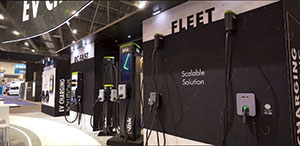
Blink Charging units on display. (JMac Productions for Blink Charging via YouTube)
“This hardware is actually new at this show,” said Rebecca Gutierrez, vice president of marketing at Blink Charging. “It has lots of smart tech designed for fleets and multiple units for any kind of overnight charging or things like that. You would have your driver card that would activate it if you need to manage the drivers, if you need to know how much you’re charging them and whatnot. And then it also pairs with the fleet portal.”
The Blink Fleet Management Portal is used to connect the chargers, the vehicles, the drivers and the managers. Fleet managers can track different analytics like consumption and when drivers are using the charging stations. It can also be integrated into existing fleet management software.
“The hardware is the hardware,” Gutierrez said. “But what you really need is an integrated solution on the software side that connects the drivers with the vehicles.”
Power Electronics USA was also at the conference to showcase its charging station technology. Its charging banks and energy storage are designed to be adaptable to the individual needs of customers. That could mean software integration with third-party protocols, back-end servers or interfaces already in place.
“A lot of fleet OEMs work with us directly,” a Power Electronics representative told TT. “One of the values we provide to our customers is a fairly flexible option base to meet their needs specifically. Because each fleet is a little different whether you’re a school bus fleet versus a Class 8 heavy-duty fleet versus a lighter transportation fleet.”
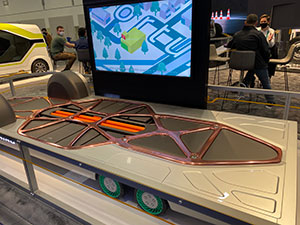
P7 platform by REE. (Connor D. Wolf/Transport Topics)
REE Automotive is a technology company that designs products to help companies build electric and autonomous vehicles. REEcorner is its premier product and packs critical vehicle components like steering, braking, suspension, powertrain and control into a single compact module unit so that companies can build flat EV platforms to provide more room for passengers, cargo and batteries.
“This is a self-contained corner,” said Peter Dow, vice president of engineering at REE. “That brings in a lot of modularity that allows us then to develop product that could go along the wheelbase, shorter tracks, wider track, long wheelbase, whichever way you want to configure the corner. We have a range of families going from small, medium and large. So from one- to two-ton applications right up to the P7, which we just announced.”
The P7 platform, unveiled during the conference, is designed for commercial delivery vehicles and walk-in vans. It is intended for Classes 3 to 5 vehicles and promises 35% more space than comparable commercial vehicles.
Want more news? Listen to today's daily briefing below or go here for more info:


